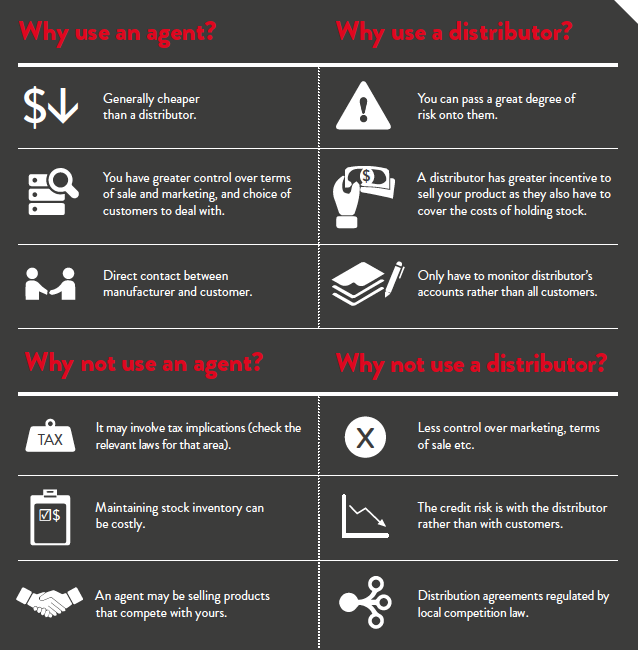Using agents in China
One of the most common methods for Australian businesses seeking to sell and distribute products within China after selling directly from Australia, is to use agents or distributors located in-market. A key step for businesses looking to expand to China is therefore to establish the availability of a reliable and competent agent.
Agents act as representatives of the supplier, and rather than taking ownership of the supplier’s goods (as is the case with a distributor), generally receive a commissions based on sales value. The supplier receives orders from the buying agents and then fulfils the orders themselves.
An agent is different from a distributor in that a distributor takes ownership of the goods by buying them and reselling them in China, either to local retailers or consumers directly. In some cases, the distributor may sell to other wholesalers who then sell to local retailers or end users.

Choosing an agent
There are several competing factors for businesses deciding whether to choose an agent or distributor. Agents are generally a cheaper option and allow a greater degree of control over sales. However, there are often attached tax implications and no guarantee that the agent is not selling a competitor’s products as well.
Agents tend to be based in China and often represent numerous services or product lines. They may operate on an exclusive basis as the sole agent of a company’s goods or services in that market, or as one of a number of agents. It is important to make sure you have the role of your Chinese agent clearly defined and confirmed in the individual agreement (contract) you have with them. It cannot be assumed that they will take on all activities that an agent will generally perform in Australia.
An important practical step when doing a fact-finding mission to China is to meet with any prospective agents to determine their competency and reliability. In-country assistants can be engaged to connect you with the right agents. Establish close working business relationships, with a high degree of trust and regular communication. Pay particular attention to the nuances of Chinese business culture. One of the best ways of determining an agent’s reliability is by meeting them in their own market and observing their knowledge and presence in the market. Ask them for trade references and consider using a professional credit-checking agency to confirm their financial stability.
Some key considerations to make before choosing an agent include:
- Do they have good networks and contacts? Do they have guanxi (relationships) with the right people?
- With is their experience in that sector? Do they have good knowledge and have they represented a similar product previously? Can they help with marketing?
- A well-established company with a good network of contacts may not be flexible or open to your ways of business.
- A young, energetic company will tend to be flexible, innovative and trying to prove its worth. The downside is it may have limited experience or contacts.
Many Chinese agents work for trading companies that are authorised to deal in a wide range of products. Some of the larger companies have offices in other countries, along with a network of offices and affiliates in China. However, large agents and distributors sometimes manage so many products that yours may not get enough attention. China’s size and regional diversity may also mean you need to engage several agents to cover different areas. For more on establishing contracts with agents, click here.
Prospective agents will likewise be looking to evaluate you as a business partner. It is thus important to ensure that your website and other primary marketing collateral is informative and attractive – not overloaded with information but cleanly laid out with interesting graphics. If applicable and possible, use customer or client endorsements and photographs to show your products or services. Make sure that contact details are easy to find and use – preferably a direct email with a photo of the staff member and have your website also accessible in Mandarin. Be aware of the national firewall in China and make sure your website is appropriate for it, ensuring that you don't rely on links to sites such as Facebook, Twitter or Youtube as these are not accessible in China. Some web domains and some email accounts are not permitted.
Want to learn more? Explore our other China information categories or download the China Country Starter Pack.
